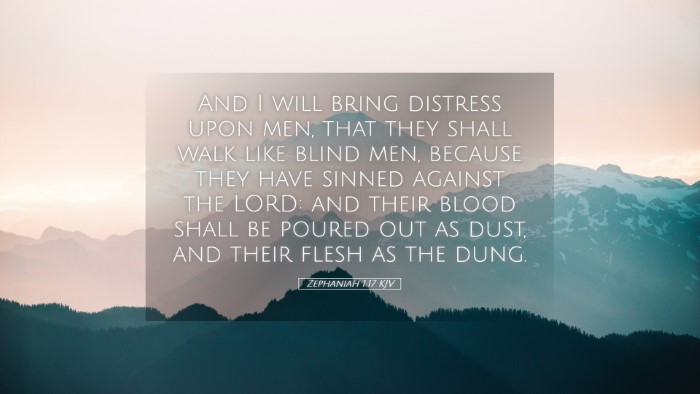Old Testament
Genesis Exodus Leviticus Numbers Deuteronomy Joshua Judges Ruth 1 Samuel 2 Samuel 1 Kings 2 Kings 1 Chronicles 2 Chronicles Ezra Nehemiah Esther Job Psalms Proverbs Ecclesiastes Song of Solomon Isaiah Jeremiah Lamentations Ezekiel Daniel Hosea Joel Amos Obadiah Jonah Micah Nahum Habakkuk Zephaniah Haggai Zechariah MalachiZephaniah 1:17
Zephaniah 1:17 KJV
And I will bring distress upon men, that they shall walk like blind men, because they have sinned against the LORD: and their blood shall be poured out as dust, and their flesh as the dung.
Zephaniah 1:17 Bible Commentary
Commentary on Zephaniah 1:17
Zephaniah 1:17 states:
The Lord says, "I will bring distress upon men, so that they shall walk like the blind, because they have sinned against the Lord; their blood shall be poured out like dust, and their flesh like dung."
Contextual Overview
The book of Zephaniah is one of the twelve minor prophets in the Old Testament. This particular verse encapsulates the profound judgment that the Lord declares upon a people who have turned away from Him. Understanding the backdrop of Zephaniah's prophecy is crucial for grasping the severity of this message.
Divine Judgment and Human Distress
The phrase "I will bring distress upon men" underscores the gravity of God’s intention. As detailed in Matthew Henry's Commentary, this distress aligns with God’s righteous anger in response to the sins of the people. It highlights the cause-and-effect relationship between divine righteousness and human actions.
Albert Barnes elaborates on this judgment by indicating that the metaphor of walking "like the blind" illustrates a complete spiritual disorientation. The people’s rebellion and sin have led them not only into physical peril but also into a state of spiritual blindness, where they are unable to discern right from wrong.
The Theological Implications of Sin
Sin is personified as the catalyst of God’s judgment. The phrase "because they have sinned against the Lord" indicates a direct correlation between the people’s actions and the divine response. Adam Clarke stresses that this acknowledgment of sin should lead to repentance; otherwise, the ensuing judgments will be unavoidable.
Furthermore, this scripture invites believers to reflect upon their own lives, recognizing that sin can lead to dire consequences. The lack of discernment among the people serves as a warning to contemporary readers about the pitfalls of ignoring God's commandments.
Imagery of Death and Destruction
Zephaniah presents two vivid images to denote the consequences of sin: "their blood shall be poured out like dust, and their flesh like dung." This imagery indicates the total disarray and loss of value of human life when it is disconnected from the Divine.
Matthew Henry points out that this stark representation reflects not only immediate physical death but also spiritual desolation. The idea of blood being poured like dust denotes a sense of utter contempt for life, suggesting that in their sin, the people have devalued themselves.
Albert Barnes adds that these expressions evoke a strong warning against the idea of security in one’s self-righteousness. The degradation compared to refuse illustrates the ultimate fate of those who oppose God's ways.
Practical Applications for Today
This verse serves as a serious admonition for Christian leaders, students, theologians, and scholars. It encourages an introspection concerning how sin is treated in personal and corporate contexts.
- Recognition of Sin: One must acknowledge the reality and seriousness of sin in both personal and societal aspects.
- Spiritual Blindness: Be wary of spiritual blindness that comes from disregarding God's commandments.
- Call to Repentance: There is an imperative for repentance; understanding that without returning to God's ways, judgment is certain.
- Value of Life: Recognize the sanctity of life, and understand that distancing from God leads to devaluation of self and others.
Concluding Thoughts
In conclusion, Zephaniah 1:17 presents a compelling message about God’s judgment in response to sin. The warnings issued throughout the text challenge leaders and students of the Bible to engage deeply with the theological implications of sin and the necessity for a sincere relationship with God. By exploring the insights provided by Matthew Henry, Albert Barnes, and Adam Clarke, one can appreciate the timeless nature of divine truth as it calls for humility, repentance, and a renewed commitment to living according to God's will.


